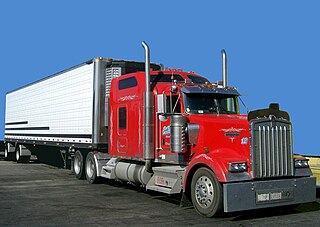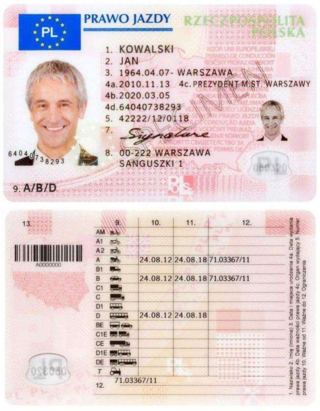
The Driver and Vehicle Licensing Agency is the organisation of the UK government responsible for maintaining a database of drivers in Great Britain and a database of vehicles for the entire United Kingdom. Its counterpart for drivers in Northern Ireland is the Driver and Vehicle Agency (DVA). The agency issues driving licences, organises collection of vehicle excise duty and sells personalised registrations.

The Driving Standards Agency (DSA) was an executive agency of the UK Department for Transport (DfT).

A commercial driver's license (CDL) is a driver's license required in the United States to operate large and heavy vehicles or a vehicle of any size that transports hazardous materials or more than 15 passengers.

The MOT test is an annual test of vehicle safety, roadworthiness aspects and exhaust emissions required in the United Kingdom for most vehicles over three years old. In Northern Ireland the equivalent requirement applies after four years. The requirement does not apply to vehicles used only on various small islands with no convenient connection "to a road in any part of Great Britain"; no similar exemption is listed at the beginning of 2014 for Northern Ireland, which has a single inhabited island, Rathlin. The MOT test was first introduced in 1960 as a few basic tests of a vehicle and now covers twenty different parts or systems on or in the car.

IAM RoadSmart formerly called the Institute of Advanced Motorists (IAM) is a charity based in the United Kingdom and serving nine countries, whose objective is to improve car driving standards, motorcycle riding standards, and enhance road safety by using the British police's system of car and motorcycle control. The System was devised in 1937 by racing driver Mark Everard Pepys, 6th Earl of Cottenham, to reduce accidents in police pursuits.

Vehicle and Operator Services Agency (VOSA) was an executive agency granted trading fund status in the United Kingdom sponsored by the Department for Transport of the United Kingdom Government.

Driver's education, driver education, driving education, driver's ed, driving tuition or driving lessons is a formal class or program that prepares a new driver to obtain a learner's permit or driver's license. The formal class program may also prepare existing license holders for an overseas license conversion or medical assessment driving test or refresher course. It may take place in a classroom, in a vehicle, online, or a combination of the above. Topics of instruction include traffic code or laws and vehicle operation. Typically, instruction will warn of dangerous conditions in driving such as road conditions, driver impairments, and hazardous weather. Instructional videos may also be shown, demonstrating proper driving strategies and the consequences for not observing the rules.
A driver's permit, learner's permit, learner's license or provisional license is a restricted license that is given to a person who is learning to drive, but has not yet satisfied the prerequisite to obtain a driver's license. Having a learner's permit for a certain length of time is usually one of the requirements for applying for a full driver's license. To get a learner's permit, one must typically pass a written permit test, take a basic competency test in the vehicle, or both.

Pass Plus Scheme commonly referred to as Pass Plus is a scheme run in the United Kingdom aimed at new drivers who have recently passed the standard driving test, which helps to give drivers the confidence to drive on their own and to increase experience on the road.
Approved Driving Instructor is a UK term for a trainer of car driving who has been tested and registered by the Driver and Vehicle Standards Agency (DVSA). UK law requires driving instructors to be qualified before they can charge for their services.
The advanced driving test is a special exam for motorists who can drive to a skill level substantially above average, and candidates who pass are called advanced drivers. It is available from several societies, including IAM RoadSmart, the Royal Society for the Prevention of Accidents, the Driving Instructors' Association DIAmond Advanced Test and the British Motorcyclists Federation (BMF) Blue Riband. There is no single "advanced test", so standards are different depending on the provider. It does not affect the driver's own licence. The test is mostly UK based; and is available for several types of vehicle depending on the provider.
The Driver and Vehicle Agency is a government agency of the Department for Infrastructure in Northern Ireland. The agency is responsible for conducting vehicle testing, driver testing and the issuance of driving licences.
The United Kingdom driving test is a test of competence that UK residents take in order to obtain a full Great Britain or Northern Ireland (car) driving licence or to add additional full entitlements to an existing one. Tests vary depending on the class of vehicle to be driven. In Great Britain it is administered by the Driver and Vehicle Standards Agency (DVSA) and in Northern Ireland by the Driver & Vehicle Agency (DVA).

Swedish driving licences adhere to a standard set in the European Economic Area. 18 years is the minimum age to obtain a licence for cars.
The Driver Certificate of Professional Competence (Driver CPC) is a qualification for professional bus, coach and lorry drivers. It has been introduced across Europe with the aim of improving road safety and maintaining high standards of driving.

Driver and Vehicle Licensing Authority (DVLA) of Ghana is the government agency responsible for the licensing and evaluation of drivers and cars in Ghana.

Driving licence in Thailand is a document that allows the holder to drive on any roads in Thailand and in other ASEAN states without an International Driving Permit. The minimum age to drive a motor vehicle is 18, and to drive a motorcycle is 15. Driving licence is issued and administered by the Department of Land Transport, Ministry of Transport and its branches, land transport offices across Thailand.

A driver's license or driving permit is a legal authorization, or the official document confirming such an authorization, for a specific individual to operate one or more types of motorized vehicles—such as motorcycles, cars, trucks, or buses—on a public road. Such licenses are often plastic and the size of a credit card.

The Driver and Vehicle Standards Agency (DVSA) is an executive agency of the UK Department for Transport (DfT).
A Lebanese driving licence is a driving licence issued by the government of Lebanon. It authorises its holder to operate various types of motor vehicles on highways and some other publicly accessible roads. It is issued by each individual district.











